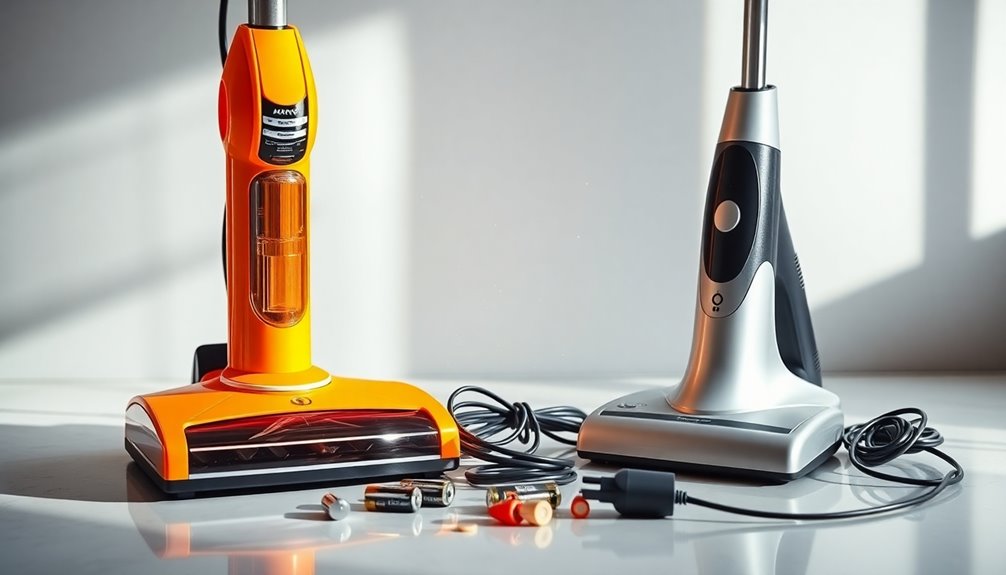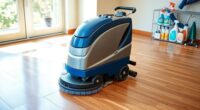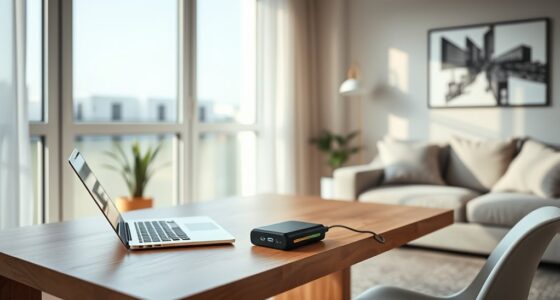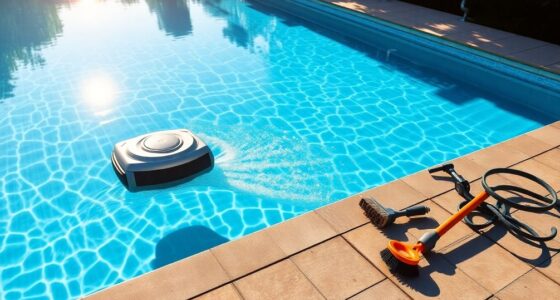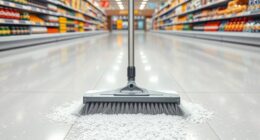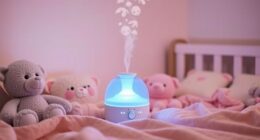When deciding between battery and electric cleaners, consider the long-term costs. Battery-powered options can have higher initial prices and replacement costs, while electric cleaners generally offer better long-term savings without battery concerns. However, battery models provide portability and convenience for quick tasks. Think about your cleaning needs and the importance of performance, maintenance, and environmental impact in your choice. There's more to explore to help you make the best decision for your cleaning needs.
Key Takeaways
- Electric cleaners generally offer long-term savings due to lower maintenance costs and no battery replacement expenses.
- Battery-powered cleaners have higher initial costs and require costly battery replacements every 2-3 years.
- Electric models provide consistent power, ideal for extended cleaning sessions without interruptions for recharging.
- Battery cleaners are more portable and convenient for quick tasks, but their overall cost-effectiveness may be less favorable over time.
- Environmental impacts differ, with electric cleaners typically consuming less energy and producing less waste compared to battery-powered alternatives.
Power Source Comparisons
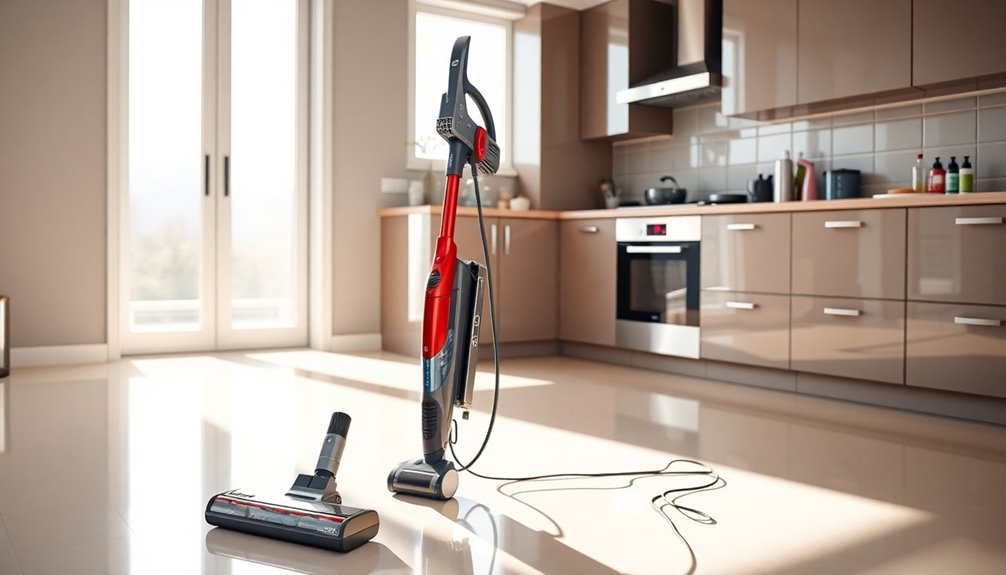
Battery-powered cleaners offer portability, allowing you to clean in areas without power outlets. However, their battery life typically lasts 2-3 years and can be costly to replace. On the other hand, electric cleaners need a continuous electrical connection, which means you won't experience interruptions for recharging. They may require more maintenance but are generally more economical over time due to efficient energy conversion. Additionally, electric pressure washers provide consistent power throughout use, making them ideal for longer cleaning sessions.
Your choice should depend on whether you prioritize convenience and mobility or consistent power for extended cleaning sessions. Consider your specific cleaning needs to make the best decision for your situation.
Performance Metrics: PSI and GPM
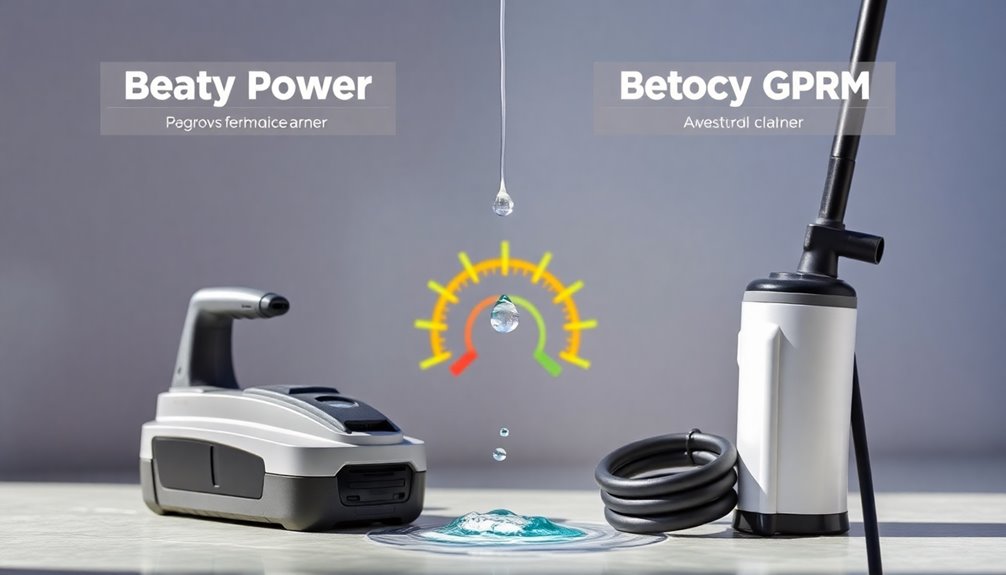
When evaluating cleaning devices, performance metrics like PSI and GPM play a significant role in determining their effectiveness.
PSI, or pounds per square inch, measures the pressure of water in electric cleaners, while GPM, or gallons per minute, assesses the water flow rate. These metrics are especially relevant for electric cleaners, as they directly influence cleaning efficiency. Higher PSI can enhance cleaning power, but it may also demand more energy. On the other hand, GPM indicates how much water is used during cleaning, which can impact environmental considerations. In contrast, battery cleaners focus more on suction power, measured in air watts, making PSI and GPM less applicable. Understanding these metrics helps you make informed decisions based on your specific cleaning needs, especially since battery performance is critical for ensuring operational duration and cleaning efficacy.
Portability and Convenience Factors
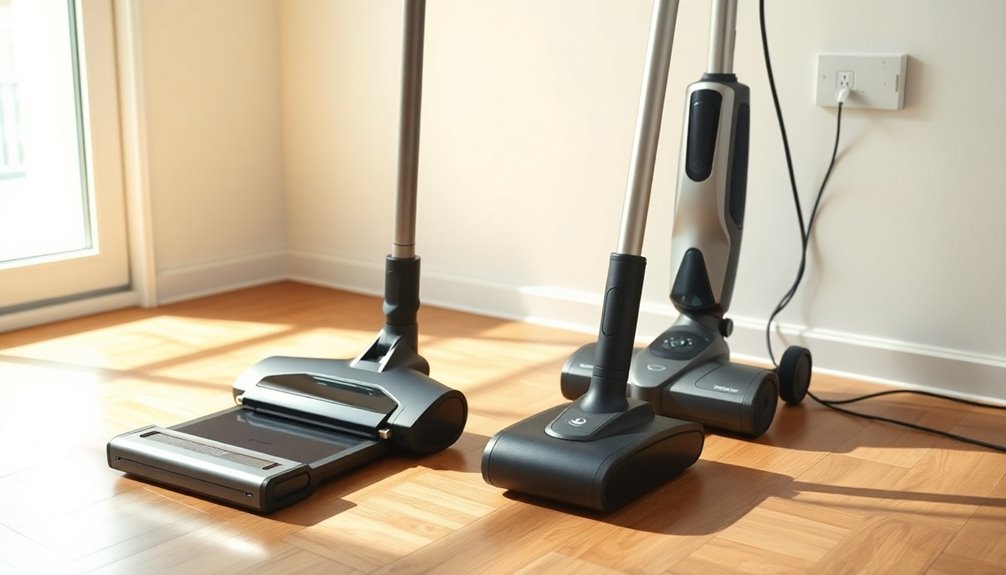
Portability and convenience are crucial factors to consider when choosing between battery and electric cleaners, especially if you value flexibility in your cleaning routine.
Cordless models excel here; their lightweight design and maneuverability make quick tasks effortless. You can use them anywhere without worrying about power outlets, enhancing your cleaning flexibility. Additionally, battery-powered devices often have the advantage of being designed for quick clean-ups without the hassle of cords.
Plus, they require minimal setup time and eliminate tripping hazards. User-friendly handles make cleaning fatigue-free, and built-in filtration systems add convenience. With lower noise levels, they're perfect for noise-sensitive areas.
On the other hand, electric cleaners come with limitations like cord management and heavier weights, making them less portable. If you prioritize ease of use and versatility, cordless cleaners might be your best option.
Environmental Impact Analysis
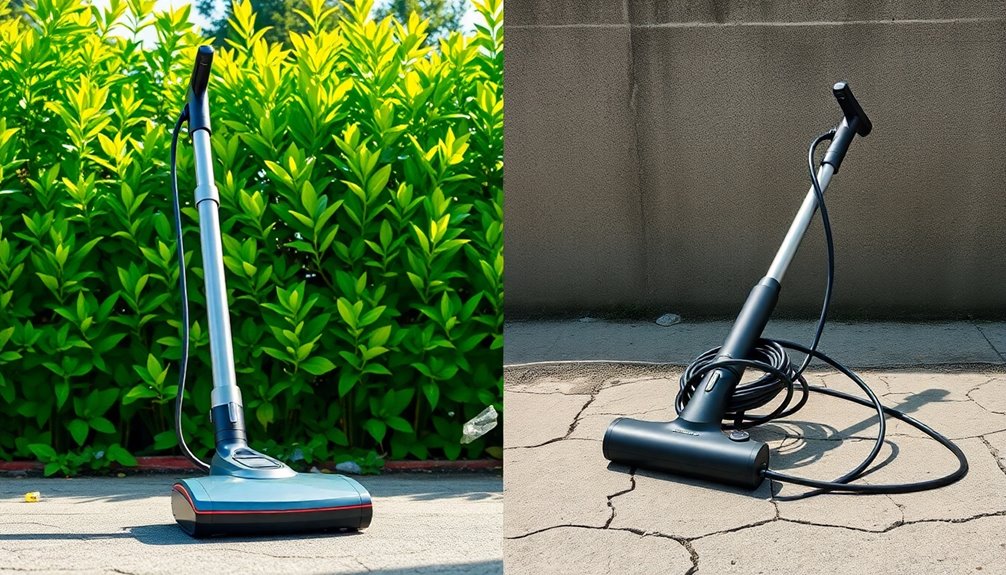
Choosing between battery and electric cleaners isn't just about convenience; it's also about their environmental impact.
Battery production often involves extracting materials like lithium and cobalt, leading to environmental degradation and human rights concerns. Additionally, manufacturing these batteries consumes significant energy, contributing to greenhouse gas emissions. Electric vehicles, which use rechargeable batteries, highlight the importance of considering the broader context of battery use in reducing carbon emissions.
On the other hand, electric cleaners generally consume less energy and reduce reliance on fossil fuels, lowering emissions. However, they can generate electronic waste, necessitating proper disposal.
Both options have their challenges, but advancements in recycling and sustainable manufacturing practices can enhance their environmental benefits.
Ultimately, your choice may hinge on the cleaner's lifecycle emissions and the energy grid's cleanliness, influencing their overall environmental footprint.
Maintenance Requirements and Costs
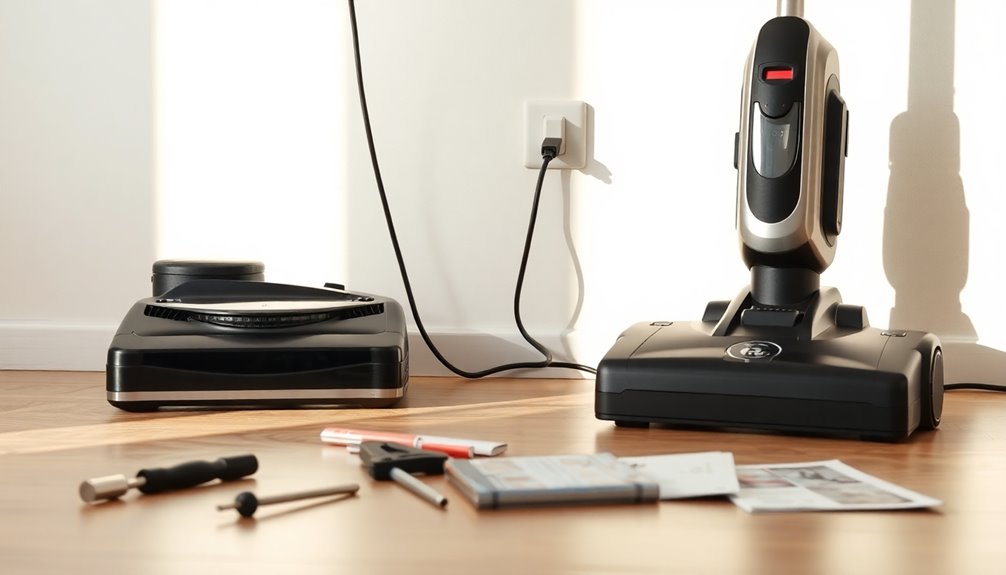
While both battery and electric cleaners have their own maintenance requirements and costs, understanding these differences can help you make an informed choice.
Battery cleaners, particularly those using lithium-ion batteries, need minimal upkeep, requiring no watering or frequent checks. However, lead-acid batteries demand regular maintenance to prevent sulfation. Additionally, flooded lead-acid batteries require replacement every 18 months to 2 years, which can add to overall costs.
In contrast, electric cleaners don't require battery maintenance, but you'll need to check motors, pumps, and cords for wear. Lubrication for moving parts is also essential.
Although lithium-ion batteries are pricier to replace, they last longer, while electric cleaners save you from battery replacement costs.
Ultimately, your choice may depend on how much maintenance you're willing to handle and the associated costs over time.
Long-Term Cost Considerations
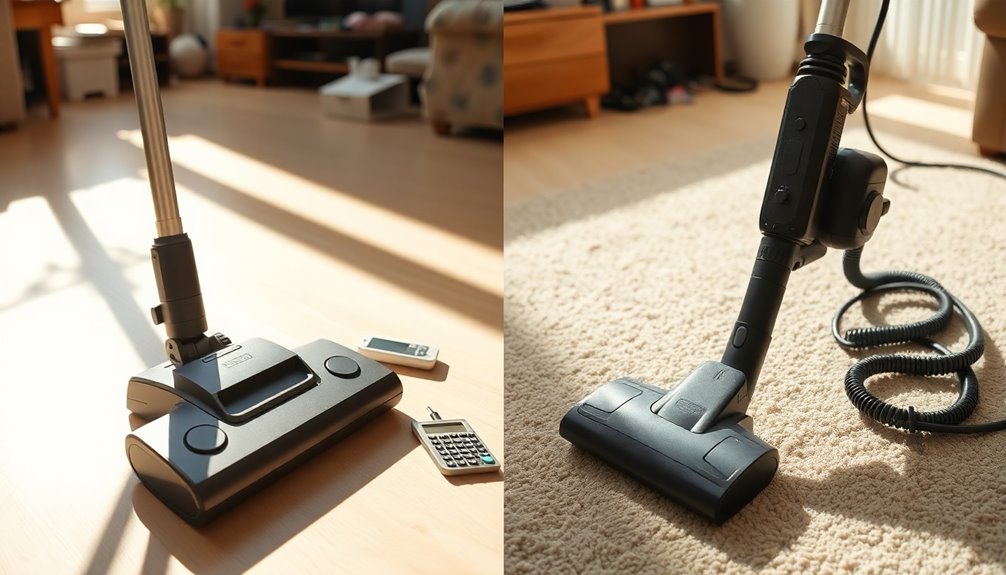
When evaluating long-term cost considerations for battery versus electric cleaners, it's essential to look beyond just the initial purchase price.
Cordless cleaners usually have higher upfront costs due to advanced battery technology, while electric cleaners are generally more affordable. However, you must consider ongoing expenses. Cordless cleaners require periodic battery replacements, which can add up significantly over time. In contrast, electric cleaners are typically more energy-efficient, which helps to incur lower operational costs. While charging cordless models may seem inexpensive, frequent use can lead to higher long-term expenses.
Ultimately, the consistent performance of electric cleaners often results in better long-term savings, making them a more economical choice for many users.
Technology Innovations in Cleaners
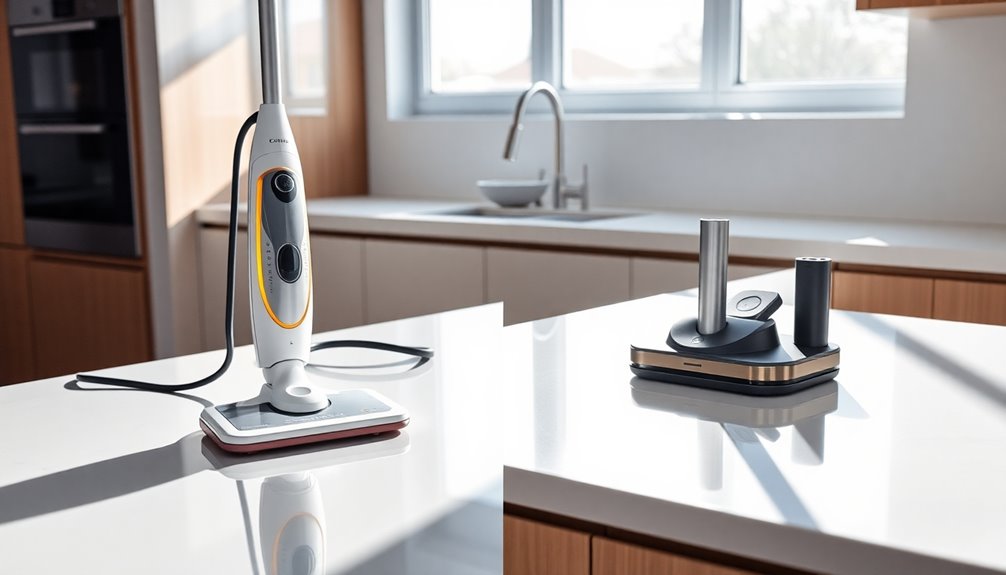
As technology continues to evolve, innovations in cleaning solutions are reshaping the way you approach cleanliness and sustainability.
Eco-friendly solutions, like those using electrolyzed water, produce effective cleaning agents from just water, salt, and electricity. This reduces reliance on harsh chemicals, appealing to your desire for safer, non-toxic options. Electrolyzed water technology represents a significant advancement in eco-friendly cleaning. Additionally, these solutions leverage predictive analytics to anticipate cleaning needs, ensuring a proactive approach to maintaining cleanliness.
Smart cleaning technologies, integrating AI and IoT, enhance efficiency by optimizing cleaning schedules and monitoring needs in real-time. Automated robots handle tasks like vacuuming autonomously, saving you time and labor costs.
Additionally, electrostatic spray technology ensures even coverage and quick disinfection, perfect for hard-to-reach areas.
With these advancements, you can enjoy a cleaner environment while minimizing environmental impact, aligning with growing sustainability concerns.
User Preferences and Use Case Scenarios
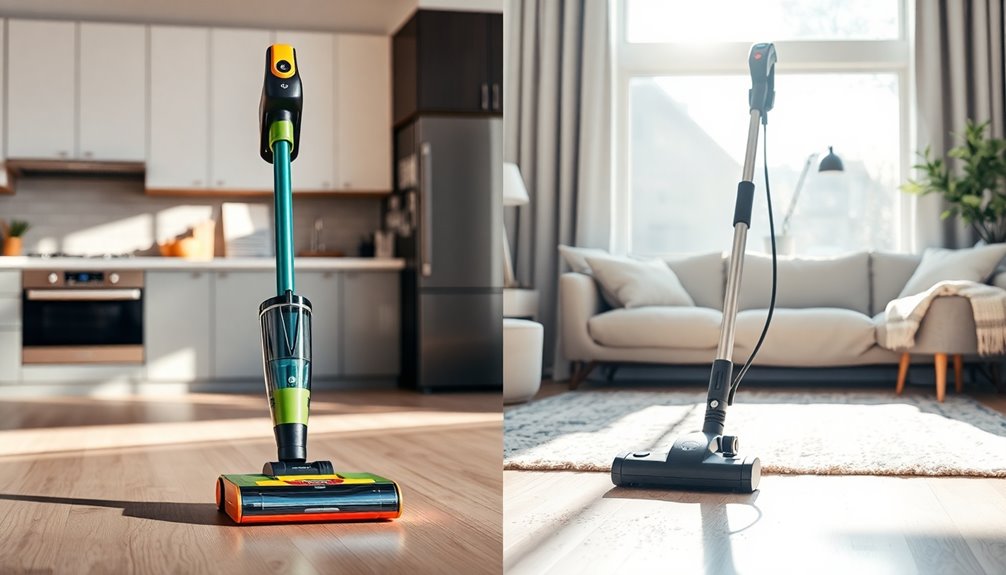
How do your cleaning needs influence your choice between battery and electric cleaners?
If portability and flexibility are priorities, battery-powered cleaners shine. Their cordless design makes navigating small spaces easier, perfect for light debris or small pool maintenance. Additionally, continuous learning about user preferences can help refine your selection process over time.
However, if you're tackling larger areas, electric cleaners might be more suitable. They offer continuous operation and robust cleaning power, handling heavy-duty tasks efficiently.
While battery cleaners can be energy-efficient, they often come with higher initial costs and the need for regular maintenance.
Consider your specific cleaning scenarios: do you need the maneuverability of a cordless model or the reliability of a corded cleaner? Your preferences will guide you toward the best choice for your cleaning needs.
Noise Levels and Their Implications

Cleaning preferences often hinge on factors like maneuverability and power, but noise levels also play a significant role in your decision-making process.
Battery-powered cleaners typically produce less noise, ranging from 70 dB to 85 dB, making them a safer choice in noise-sensitive environments. In contrast, electric cleaners can reach levels between 80 dB and 95 dB, which pose health risks if used for extended periods. Additionally, suction cleaners often provide better suction and cleaning efficiency, which can be a deciding factor for those prioritizing performance over noise.
Prolonged exposure to noise above 70 dB can lead to hearing loss and other long-term effects. By opting for a quieter battery-powered model, you not only protect your hearing but also reduce noise pollution, benefiting both your household and the surrounding wildlife.
Consider how noise levels affect your cleaning experience and well-being.
Final Thoughts on Choosing the Right Cleaner
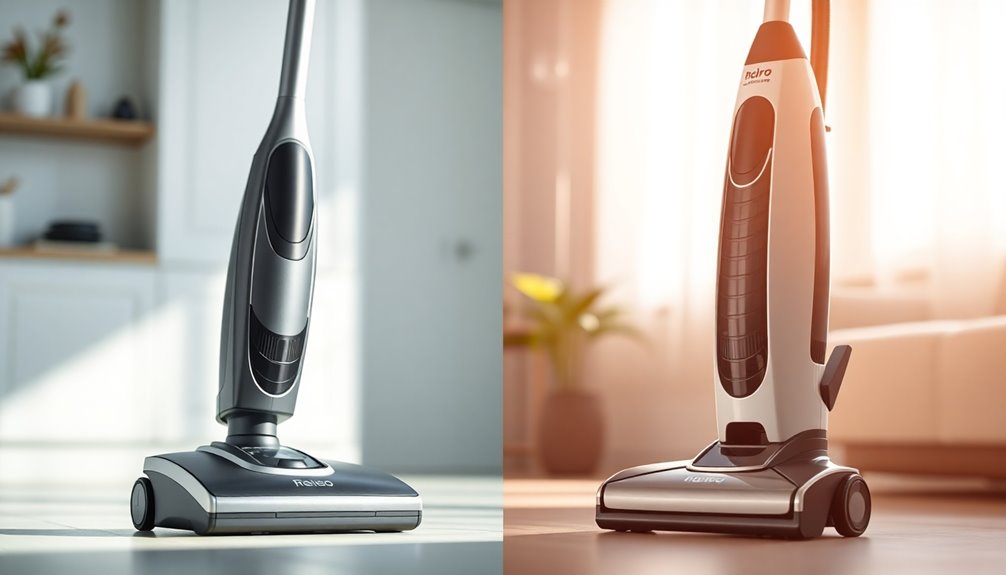
Which cleaner fits your needs best?
If you tackle heavy-duty cleaning tasks, an electric cleaner is your go-to option for consistent power and efficiency. They may have lower upfront costs and offer long-term savings since you won't need to worry about replacing batteries. Additionally, cordless models can be very effective for smaller pools, making them a viable option for those who prefer a cleaner look without visible cords.
On the other hand, if you prioritize portability and convenience for light-duty tasks, battery-powered cleaners might suit you better, despite their power decline over time.
Consider the environmental impact as well—electric cleaners generally have a lower carbon footprint.
Ultimately, think about your cleaning habits and preferences. Whether you choose battery or electric, understanding your needs will lead you to the right decision for a cleaner home.
Frequently Asked Questions
How Do Battery Life and Charging Time Affect Cleaning Efficiency?
Battery life and charging time significantly impact your cleaning efficiency.
When you use cleaners with long-lasting batteries, you can operate them longer without interruption, minimizing downtime.
Fast-charging options help you get back to work quickly, which is crucial in busy environments.
Reliable battery performance ensures consistent results, while efficient charging reduces energy waste and operational costs.
Are There Specific Brands Known for High-Quality Battery-Powered Cleaners?
Did you know that nearly 70% of consumers now prefer battery-powered cleaners for their convenience and efficiency?
If you're looking for high-quality options, brands like Dyson, Tineco, and Samsung stand out.
The Dyson V15 Detect boasts impressive suction power and battery life, while Tineco PURE ONE S11 offers smart features.
Samsung Jet 90 Complete combines strong performance with innovative attachments, making it easy for you to tackle any mess effectively.
Can Electric Cleaners Be Used Outdoors Safely During Rain?
Yes, you can use electric cleaners outdoors in light rain, but you need to be cautious.
Ensure your equipment is designed for outdoor use and has waterproof components to prevent electrical shock.
Avoid using them during heavy rain or thunderstorms due to the risk of electrocution.
Always assess the conditions and consider hiring professionals if you're unsure about safety protocols.
Remember to maintain your equipment for optimal performance in varying weather.
What Safety Measures Should I Consider for Battery-Powered Cleaners?
When handling battery-powered cleaners, you've got to balance convenience with safety.
Always store batteries in a cool, dry place and use personal protective equipment. Before using the cleaner, inspect the batteries for damage and avoid overcharging.
Make sure your workspace is uncluttered and well-lit to prevent accidents.
How Do I Choose the Right Accessories for My Cleaner?
To choose the right accessories for your cleaner, consider the surfaces you'll be cleaning.
Bare floor brushes work well on hard floors, while crevice tools help in tight spaces.
If you have upholstery, opt for specialized tools to tackle pet hair.
Check compatibility with your vacuum model, and prioritize high-quality materials for durability.
Lastly, select versatile attachments that make your cleaning tasks easier and more efficient, ensuring you get the best results.
Conclusion
So, you've weighed the pros and cons of battery and electric cleaners, huh? It's funny how you started this journey thinking you'd find the ultimate money-saver, only to realize it's really about what fits your needs best. Who knew that in the quest for savings, convenience and performance would steal the spotlight? In the end, whether you go green with electric or embrace the freedom of battery power, you'll likely end up spending more time cleaning than you planned!
